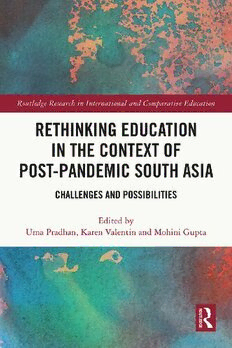
Rethinking Education in the Context of Post-Pandemic South Asia: Challenges and Possibilities PDF
243 Pages·2023·2.692 MB·English
Most books are stored in the elastic cloud where traffic is expensive. For this reason, we have a limit on daily download.
Preview Rethinking Education in the Context of Post-Pandemic South Asia: Challenges and Possibilities
Description:
This edited volume offers new analytical and methodological approaches to the study of education in the post-pandemic educational context, through case studies from countries in South Asia such as Bhutan, India, Nepal, Pakistan and Sri Lanka. Crossing disciplinary and national boundaries to advance collaborative knowledge production in South Asian education, the book explores how different colonial legacies, religious orientations, and positions in the global economy are played out in regional education systems. In doing so, this volume focuses on the educational challenges faced by the region to better understand South Asian society and the existing societal inequalities in the wake of COVID-19. The book highlights how the pandemic invites a re-thinking of current ways of approaching educational research in hybrid forms, and also opens up new areas of research ranging from pedagogical innovations to the well-being of teachers and students.Offering interdisciplinary perspectives on education in this unique context, this timely book will be highly relevant to students, researchers, and academics in the fields of international and comparative education, South Asian studies, teacher education, and education policy and politics.
See more
The list of books you might like
Most books are stored in the elastic cloud where traffic is expensive. For this reason, we have a limit on daily download.
